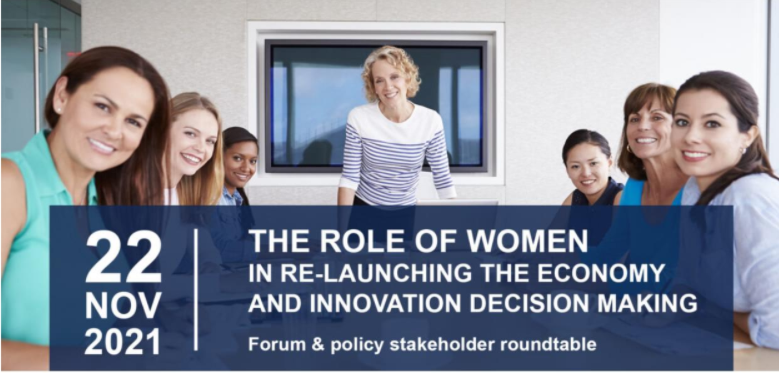Three key factors for becoming a successful entrepreneur
Being an entrepreneur is challenging, exciting, fun and a lot of hard work. The process of defining what Your business should be all about is important and it always starts with the big WHY. Defining the problem, you’re solving, presenting the solution, and develop a plan to reach your target audience are steps in your journey of becoming a successful entrepreneur.
Define Your WHY!
The big Why is not about making money, it´s about your reason to be, your purpose. In order to be successful You need to have a clear purpose, a mission You really belief in. The business and the purpose have to be true and heartfelt. Not many companies have a clear understanding of the big WHY, so You can actually achieve a competitive advantage by defining your true purpose and communicating it to your stakeholders. To become a successful entrepreneur, there are three important factors You need to be aware off.
Firstly, you need to define what problem Your business is solving. People are concerned about solving their problems or fulfilling their needs. And when you´re company has the solution it´s a potential success story. And remember, focus on the solution. Companies tend to communicate what a product or service is, rather than focusing on the problem they solve.
Secondly, check if the primary target audience actually have this problem and therefore need You. Get to know you´re target audience, what are their needs, desires, concerns and ambitions, rather than just focusing on demographic characteristics. You need to earn their trust in order to become the problem solver they need.
Maintain logical order
When you defined the problem you´re solving and you´re getting familiar with the target audience, first then You can start making Your business plan. Many entrepreneurs start at the wrong end and start planning before they have formulated the big WHY and what problem they are solving. They often start with questions like:
How can I reach, acquire, and keep customers?
How do I best define and differentiate my product/service?
How can I generate revenue?
What's your cost structure?
What's your profit margin?
Those are important questions, but should be a part of your plan, not you´re initial concerns.
So, to sum it all up, three key factors of a successful entrepreneur are:
- Defining the problem your solving
- Checking if the target audience needs your product or service
- Making a good plan
Ask for feedback!
And a good piece of advice always is – talk to others, ask for advice and second opinions. Present Your business ideas to people You know and listen to their feedback. Testing can help you adjusting your business idea. Getting different perspectives on your story, your mission and your ideas, will help you to design the best and most relevant business plan. You can use the elevator pitch technique. That is a short, pre-prepared speech that explains what your company does, clearly and easy to understand. And You should do it in 30-60 seconds. It’s not a lot of time, so keep it short, define the problem you’re solving and the solution You offer. Present it as the auditor is your target audience.
It´s also a good idea to check opportunities regarding entrepreneurship trainings or programs. Many entrepreneurs think they need to solve all the challenges themselves, but together we´re stronger.
Good luck of becoming a successful entrepreneur!
Byline; Lotte Frost
Seven Breakthrough Lessons on How to Take off as a Business Angel?
The very first training series tailored to the needs of Central and Eastern Europe, ranging from the ecosystem to business angel investment or mentoring, starts on the 1st of March.
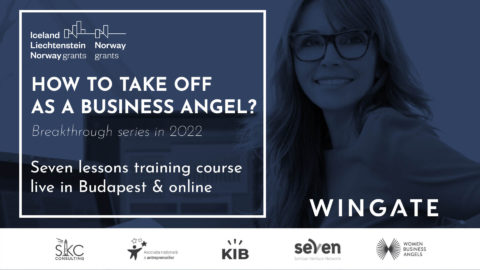
Have you ever felt like a start-up business that a decade of business experience would be helpful? As a leader in a large company, are you thinking about becoming an angel investor?
You are in the right place!
The Women / Business / Angels Association aims to connect stakeholders from business, governments, and NGOs in the region and organise training and club events to increase the number of business angel investors and innovative companies in CEE.
From the 1st of March, 2022, Women / Business / Angels will start its series of seven training courses with the partners of the WINGATE project members from five countries and HUBHUB Hungary. The event is open to female and male senior executives interested in the existing innovation ecosystem or start-ups looking for an investor or a mentor with global experience.
Through this seven-occasion initiative, Women / Business / Angels aim to share knowledge, ensure a place to ask questions, and help networking.
The training course leader is Imre Hild, managing director of Global Traction and the head of training of the Women / Business / Angels Association. Péter Csillag, the newly elected president of HUNBAN, will also perform on the first occasion on the 1st of March.
>> Participation at the events is free of charge, but registration is required.
The language used will be English, without translation.
Registration: How to Take off as a Business Angel – The Innovation Ecosystem.
Place: HubHub Agora, Árbóc utca 1-3, Budapest 1133
Zoom link to join online: https://us02web.zoom.us/j/85936443067?pwd=NGpVeFpVZzFMZUJtVGJjU1dEUkhWdz09
The seven breakthrough lessons are free for participants thanks to the WINGATE project which is funded by Iceland, Liechtenstein and Norway through the EEA and Norway Grants Fund for Regional Cooperation. Women / Business / Angels is a beneficiary member of this consortium.
Schedule and Topics for 2022
1st of March – The Innovation Ecosystem
What does innovation mean in practice? What kind of environment and structure improves innovation? Who are the key players? How is it evolving? How is the global market, and where does the CEE stand in this competition?
31st of March – The Start-up Environment
What is a start-up? How does the start-up lifecycle look? What makes a company valuable?
3rd of May - The Business Angel Investor
Who are the business angel investors, and what do they do? Why does it make sense to become an angel investor? Risk management and portfolio building.
7th of June - The investment
What does an angel investment mean? What is the due diligence process? How do they work in a syndicate of angel investors? How do we handle exits?
4th of October – Me as an investor
Why, and how to become an investor? What is your role in the value creation and growth of a start-up? Where and how to find other business angel investors?
8th of November – Me as a Mentor
Why, and how to become a mentor? What is your role in the value creation and growth of a start-up? Where and how to find other business mentors?
13th of December - How to Keep Mentoring?
How to build a portfolio of mentoring and angel investments?
"We bring together multiple countries and organisations to increase the region's capacity for innovation through the training courses that are just starting. We aim to improve the Central and Eastern European region in the global innovation competition by increasing the number of female and male business angel investors." - said Eszter Szabó, President of the Women / Business / Angels Association.
Background
The Women / Business / Angels Association
Women / Business / Angels Association aims to have more businesswomen, more innovation, more co-education to increase the innovation capacity of our region. With its partners, especially HUNBAN and other angel investor organisations, the Association is building a European best practice (Candace Johnson, President of EBAN 2017) to grow the presence of women in innovation decision-making. It involves and prepares women to become angel investors through its training courses and club events, and it does this in a region where the market economy dates back only 32 years.
#CEEforInnovationHub #TogetherCreatingTheEconomicFuture #WBAangels #innovation #economicfuture #womenbusinessangels
https://www.wbusinessangels.com/
THE WINGATE Project
Women/Business/Angels is a beneficiary partner in the WINGATE project, funded by Iceland, Liechtenstein and Norway through the EEA and Norway Grants Fund for Regional Cooperation. This consortium work across Norway, Serbia, Hungary, Romania and Moldova supporting and training women entrepreneurs and women business angels. The consortium members are Kvinner in Business in Norway, SEVEN in Serbia, SKC-Consulting Kft. and the Women / Business / Angels Association in Hungary and ANAA in Romania and Moldova. The aim is to increase women's participation in starting a business and investing in angels.
Implemented by:

Gender equality will lead to improving living conditions in any economy
Gender equality must be a priority at a national level, this right must not only be recognized but also effectively applied to all aspects of life: political, economic, social and cultural. Only together, through mutual support and appreciation, the cooperation of men and women will lead to gender equality and to an improvement of living conditions in any modern economy. This was the central message of the conference organized by the National Association of Entrepreneurs "Women's Entrepreneurship in an Innovative and Changing World", within the WINGATE project: "Together for a competitive, inclusive Europe".
Her Excellency, Siri Beate Barry - Ambassador of the Kingdom of Norway in Bucharest, present at the event, said: “Women's participation is on Norway's agenda and has become a core value and a Norwegian standard. Gender equality affects all aspects of our lives. Cross-border collaboration in Europe is valuable, and we can gain by sharing experiences, learning from each other, and looking for solutions together, such as through the Wingate project. I can't stress enough how important it is for women and men to work together to achieve gender equality.”
For her part, Cristina Chiriac, president of the National Association of Entrepreneurs, ANAA, has the opinion that: a stronger support of women's rights, empowering women and ensuring gender balance, will enable all economies to reap the full economic and social potential that they bring as a contribution to society. Negative gender stereotypes must be abandoned, and the support of women by men is a priority for them to reach their full potential. Studies show that more and more women want to become financially independent, open their own business and perform in their fields of activity”. She believes that "in today's and tomorrow's world, real equality between women and men is also the key to our economic and social success - not only at European and national level but also in our regions, cities and local communities."
The main objective of the WINGATE project is to create an online platform and an innovative learning center where specialized courses on business ideas, management and business plan, the establishment of a start-up and notions of negotiation, business strategy, communication and PR will be developed. This tools will provide opportunities for participants to improve their presence in the local and international market.
The conference was moderated by Dan Doroftei - entrepreneur and health consultant and started with the messages of the officials: Her Excellency, the Ambassador of the Kingdom of Norway in Bucharest, Siri Beate-Berry, the representative of the Romanian Parliament, Ana Loredana Predescu, deputy, Cristina Chiriac - president of the National Association of Entrepreneurs and Andreea Negru - moderator of the first panel of the conference and Communication Expert of the Wingate project. The second panel "Cross-border cooperation, European economic stimulus", moderated by Roxana Gabor Iliescu, entrepreneur, founder of Mai Academy, with the following speakers: Agnes Puscas - Project Manager Wingate (Hungary), Aleksandar Bijelic - President of Serbian Venture Network Senev (Serbia) ), Marit H. Silseth - Project Officer Wingate Norway and Angela Gladei - President of the Association of Women Entrepreneurs of the Republic of Moldova (AFAM). In the chapter "Education and innovation", moderated by Nicoleta Munteanu - founder of Kids in Business, Tova Ben-Nun Cherbis - president and founder of Lauder-Reut Educational Complex, Marius Ghenea - entrepreneur, business angel and author, Corina Puiu - director had presentations executive Rethink and Ana Maria Stancu - CEO of Bucharest Robots. The conference ended with a panel dedicated to "Pandemic Lessons", moderated by Cristina Dragna - entrepreneur, strategic communication specialist, with the following guests: Raluca Ioana Man - founder of RSEVEN LTD (Cyprus), Daniela Cireașă - founder of Netspace, president of CONAF Brăila, Alina Pătrăhău - the founder of Dăruiește Aripi Association and Mirela Bucovicean - founder of Molecule F.
The event was part of the WINGATE project which will run for a period of 3 years and aims to help women entrepreneurs and business angels in their growth and development.
The project partners are: SKC-Consulting (Hungary) main partner, Serbian Venture Network (Serbia), Women Business Angels (Hungary), Kvinner i Business (Norway) and the National Association of Romanian Entrepreneurs, which also covers the Republic of Moldova.
The Wingate project is funded by Iceland, Liechtenstein and Norway through the EEA and Norway Grants Fund for Regional Cooperation.
Report on the First Regional Forum on The role of women in innovation decision making
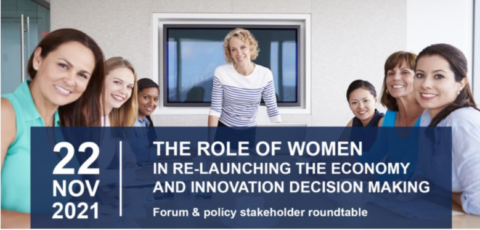
Stakeholders from Nine Countries Joined the First Regional Forum on
The role of women in re-launching the economy and innovation decision making
On 22 November 2021, countries of Norway, Hungary, Slovakia, Poland, the Czech Republic, Georgia, Serbia, Romania and Moldova joined the regional forum in Budapest, supported by the International Visegrad Fund and the EEA and Norway Grants Fund for Regional Cooperation.
At the hybrid event titled „The role of women in re-launching the economy and innovation decision making” speakers included Marianna Neupauerová (Deputy Director, International Visegrad Fund), Irén Márta (Director, Business Council for Sustainable Development in Hungary), Aleksandar Bijelić (Director, SeVeN, Serbia) and Janina Lamøy (Innovation Norway). The organizing Women/Business/Angels Association (WBA) aims to connect CEE stakeholders and to share best practices from business, academia and government.
„It is Women/Business/Angels/ Association’s strong belief that by connecting business angel investment and funding with innovative companies, countries can accelerate innovation capacity building as a competitive advantage in CEE” – pointed out Eszter Szabó, founding President.
„Working with CEE and Norway shows that there is a lot in common in the two places while building a stronger innovation ecosystem. We can learn from each other’s experiences and connections” – said Rita Anson from Winnetwork, Norway.
The Forum is a milestone in the efforts of Women/Business/Angels Association to invite more women into innovation and investments. Built on this stakeholder meeting WBA will present for chambers of commerce and major companies the need and opportunity to cooperate. WBA also starts a 5-session angel investing and mentoring training for CEE in the first half of 2022. For more information, please visit http://www.wbusinessangels.com/en/ or email womenbusinessangels@gmail.com.
Click here for a more detailed summary of discussion on the forum!
The WINGATE project: Serbia, Romania, Moldova, Hungary and Norway
Women/Business/Angels is a beneficiary partners in the WINGATE project, funded by Iceland, Liechtenstein and Norway through the EEA and Norway Grants Fund for Regional Cooperation. This consortium works across Norway, Serbia, Hungary, Romania and Moldova, supporting and training women entrepreneurs and women business angels.
The Visegrad 4+ project: Visegrad 4+ countries
Women/Business/Angels Association is the consortium leader of a project, co-funded by the International Visegrad Fund, with participating partners from the Czech Republic, Poland, Slovakia, Georgia and Moldova besides Hungary. We aim to support the development of business angeldom and innovation ecosystem building in these countries and within that, the role that women play in making investment decisions in innovative startups.
Implemented by:
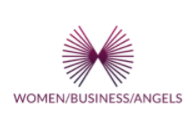
Business/Women/Angels Association aims to grow the number of angel investors in Central and Eastern Europe (CEE) and works with its coalition partners. The Association invites a wider audience, both women and men, to gain experience, learn about new opportunities and new ways to make the region’s economy stronger while having a return on investment for each. The Association was recognized as a European Best Practice by Candace Johnson, President of EBAN in 2017. The Association is non-profit, non-partisan. Members pay a yearly membership fee.
Follow Women/Business/Angels on social media for latest news:
Facebook: https://www.facebook.com/wbusinessangels/
Linkedin: https://www.linkedin.com/company/women-business-angels-hu/
Website: http://www.wbusinessangels.com/en/
Inclusive solutions to common challenges
Summary of a roundtable with projects implemented under the EEA and Norway Grants Fund for Regional Cooperation
The second meeting held on the first day of the Regional Funds Week was dedicated to inclusiveness, one of the core objectives and values promoted not only by the EEA and Norway Grants, but across the European Union. This event was hosted by Katarzyna Zabratańska, Manager for Equality and Inclusive Culture at Żabka Polska, the participants were welcomed and introduced to the topic by Nora Mehsen, Sector Officer at Funds and Horizontal Concerns Unit from the Financial Mechanism Office. Representatives of seven projects implemented under the Fund for Regional Cooperation participated as speakers in
the meeting, which attracted nearly 60 spectators joining online.

At the beginning of the roundtable we had the opportunity to learn more about the projects represented by the speakers – who they target, what their goals are and how they want to reach them. We also got to know the achievements to date of individual initiatives, who were willing to share their experience and knowledge. The representatives answered a question which dimensions of diversity are the most important and priority from the perspective of their actions, giving particular examples from their countries, organisations and projects. After a brief introduction, it was the turn of the individual presenters to speak. David S. Evangelista, President and Managing Director of Special Olympics Europe Eurasia, from "Inclusion through sports for children with developmental disabilities” project and András Nun, Executive Director at Autonomia Foundation, representing "New solutions to old problems" project, talked about the biggest barriers and stereotypes about specific groups they work with/for. Ágnes Puskás, Project Manager at SKC Consulting from “Wingate” project, focused on the identification of skills that, according to the women from different countries she previously interviewed, are perceived as obligatory to succeed in business. The topic of skills was also developed by David S. Evangelista, who furthermore addressed the issue of specific essential competences which his project tries to develop among children with intellectual disabilities, indicating how to achieve it.
How to describe the role of civil society and grassroots movements in creating and implementing inclusive solutions and what are their advantages comparing with top down approaches was then discussed by Veronika Móra, Director at Ökotárs Alapítvány – Hungarian Environmental Partnership Foundation, from "Reclaim our civil space!" project and Elisa Lironi, Senior Manager, European Democracy at ECAS – European Citizen Action Service, representing “Co-Deciding Europe: Civic Tech for Good Governance and Active Citizenship!” project. The topics such as how do they understand being active citizen and what are their definitions and benchmarks were addressed, too. Elisa also tried to answer the question on how we can deal with inclusiveness challenges using big data and AI.

Later in the meeting we were able to learn a little more about the specifics of the project “HOPE – HOlistic radicalisation Prevention initiative", whose representatives – Pedro das Neves, Chief Executive Officer at IPS Innovative Prison Systems together with Ljiljana Palibr, Project Manager of the Helsinki Committee for Human Rights in Serbia – talked about the role of specific partners and stakeholders from the countries where they cooperate, taking into account that the project has ambition to craft holistic and systemic solutions. The questions that were answered were also how to use partners’ potential, who plays the strategic role and why. Shortly afterwards Pedro das Neves, Ágnes Puskás and András Nun shared some best practices from their projects, then all representatives have indicated their recommendations and foresights referring to building inclusive society and solutions in (post)pandemic context. “The most important reflections I have after our roundtable are that, firstly, we must work collectively, inclusiveness is team-work. Together we are powerful and impactful. We will struggle with different obstacles and we will grow,” Katarzyna Zabratańska, the moderator, said. “Secondly, we have to always keep in our minds that inclusiveness and equality mean working «with»instead of working «for» our communities. That’s the most respectful and efficient way of empowering people and expose their subjectivity. And the last thing, we cannot underestimate role of small steps and starting exactly from where we stand. We all have ambitions to deploy systemic changes, and there is no doubt they are needed, but it’s evolutionary approach which demands consistent and persistent work day after day”, she added, concluding the meeting.

The female CEO stimulates gender diversity in a company

The number of women on boards has doubled under the leadership of a woman (29%), compared to a man-led board (16%) globally, according to the fifth edition of the Deloitte Women in the Boardroom study. These percentages are almost identical to the relationship between a female CEO and the number of women on the boards of directors of that company (29%), compared to a company led by a male CEO (15%).
Globally, 15% of all board positions are held by women, a modest 3% increase from 2015, according to Women in the Boardroom, a study that looks at the efforts of more than 60 countries to promote gender diversity. within the boards of directors. Women are still under represented in councils, despite the benefits of gender diversity in place.
In Romania, women occupy 10% of the seats on the boards of directors of large listed companies, 12% of the non-executive roles of the highest rated companies and 15% of the seats on the boards of supervisors of all companies listed on the Bucharest Stock Exchange.
- America's boards of directors are not very diverse
In the United States, only 14% of board seats are held by women, an increase of only 2% over the 2015 edition. In Canada, the percentage of women on boards has increased to 18%, with 5% more than in 2015. In Latin America and South America, only 7% of board seats are held by women and only 2% of leadership positions on a board are held by women.
- Progress in the EMEA region varies significantly
Romania is behind the other countries in the European Union with only 12% of non-executive positions held by women, compared to the EU average of 23%. Norway, the first country to introduce a diversity quota, has the highest percentage of women on boards (42%). There is no gender diversity quota in the UK, but 20% of council seats and 3% of board positions are held by women. The percentage of women on boards has increased to 28% in Italy, but the number of women chairing boards has fallen by 14% since 2015 and so far to 9%.
- In Australia and Oceania, gender diversity on boards is growing
In Australia, the figures continue to improve as the percentage of women on boards increases to 20%, and 5% to management positions on boards. New Zealand has seen the largest increase since 2015, with 28% of council seats held by women.
- Asia-Pacific lags behind other regions
With only 8% women on boards, gender diversity in some major Asian economies is modest compared to other global regions. Only a few Asia-Pacific countries have mandatory quotas or other solutions to this problem.
The role of women in re-launching the economy and innovation decision making
Forum & policy stakeholder roundtable
Hybrid event
Live in Budapest (Millenáris, 1024 Budapest, Kis Rókus u. 16-20 & online
22 November 2021
The global pandemic has affected our lives in almost every aspect from our health and families to our economy and our prospects. It is a challenge not only to re-launch the economy but to re-launch it on a path that leads to more resilience, growth and sustainability on a national and a regional basis.
This path should include more women and more investments into innovation in the V4+ and the Central-Eastern European regions where market economy is much younger than in Western Europe. As a non-profit, nonpartisan organisation driving the discussion we connect stakeholders from two axes - V4+ countries plus Norway, Serbia, Romania – for the first time. This is why a policy discussion is long due on the topic of business angel investments, innovative start-ups and more female participation in both parts. We invite the stakeholders to discuss their approach, share their opinions and display their results in special roundtables on innovation and business angel investments.
Women/Business/Angels Association holds a special, hybrid forum on 22 November from 15.00 to foster communication among the key players of these regions and topics, and to allow drawing conclusions in terms of good practices for the future. The forum will start with a welcome and a keynote, then from 15.30 a stakeholder panel debate will be held on how to involve more women into innovation funding. In the second half of the event, from 16.20 the WINGATE project will be introduced in more details, focusing on the founding side of startups, titled Innovation in many colors – Innovation support case studies. The event will be closed at 17.30.
>> The event is an opportunity to learn from the experiences of two different projects that nevertheless have similar goals – supporting innovative women entrepreneurs and business angels - and an overlapping geographical coverage.
The WINGATE project: Serbia, Romania, Moldova, Hungary and Norway
We are also beneficiary partners in the WINGATE project, funded by Iceland, Liechtenstein and Norway through the EEA and Norway Grants Fund for Regional Cooperation. This consortium work across Norway, Serbia, Hungary, Romania and Moldova, supporting and training women entrepreneurs and women business angels.
The Visegrad 4+ project: Visegrad 4+ countries
Women/Business/Angels Association is the consortium leader of a project, co-funded by the International Visegrad Fund, with participating partners from the Czech Republic, Poland, Slovakia, Georgia and Moldova besides Hungary. We aim to support the development of business angeldom and innovation ecosystem building in these countries and within that, the role that women play in making investment decisions in innovative startups.
For personal attendance, please send an email to womenbusinessangels@gmail.com.
For online participation, please register in Zoom: https://www.wbusinessangels.com/en/
Wingate – Partners meeting 27.08.2021
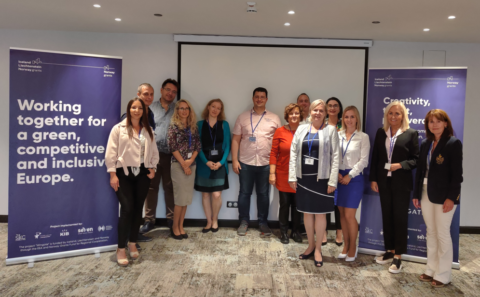
We have an extremely meaningful 1 year behind us in the project, which until now - adapting to the current world situation - could only managed online.
We had just waited long enough for the opportunity to meet in person, so at the end of August we took it to deepen the working relationships and collaborations known only from the online space to offline meeting room.
Although there were regular consultations in the background in order to reach and serve our target group as effectively as possible, a strictly online discussions certainly has their drawbacks.
… interpersonal chemistry, team building is important!
In the Wingate project, in addition to creating a highly innovative e-platform with vast professional knowledge - where we will offer free trainings, workshops and networking opportunities for women entrepreneurs, we also aim to strengthen regional cooperation between partners.
In the Wingate project, in addition to creating a highly innovative e-platform with vast professional knowledge - where we will offer free trainings, workshops and networking opportunities for women entrepreneurs, we also aim to strengthen regional cooperation between partners.
We hope that the personal meeting will give further impetus to the realization of our project with even greater enthusiasm and vigor.
Special thanks for the Royal Norwegian Embassy for their representation with Mr. Håvard Austad Counsellor joining us at our Partners' Meeting Networking Party.
Thank you for the proactive cooperation of our partners:
- National Association of Entrepreneurs (ANAA)
- Women/Business/Angels Association (WBA)
- Serbian Venture Network (SEVEN)
- Kvinner i Business (KiB)
- SKC-Consulting Ltd. (SKC)
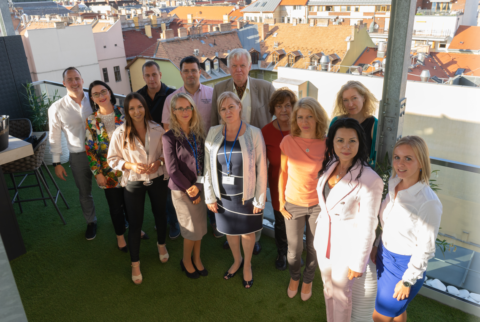
Romania and Moldova- close collaborations for supporting and promoting female entrepreneurship
Digitization, innovation, entrepreneurship education, bilateral relations between the Romanian and the Republic of Moldova regarding business environment and academic cooperation were some of the most important topics addressed in Chisinau, during the Economic Forum "Opportunities to invest in the Republic of Moldova and Romania", organized in Chisinau on the 14th of July, with the participation of ANAA (National Association of Entrepreneurs) delegation led by the President of the association, Cristina Chiriac.
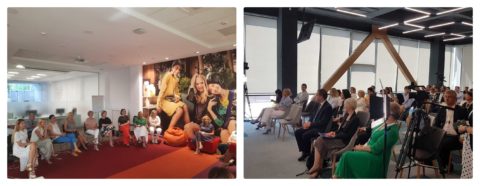
The visit to the Republic of Moldova focused on a series of bilateral meetings with representatives of the business environment, the associative and academic environment and the official meeting with the Romanian Ambassador to Chisinau, Daniel Ioniță.
Also, during the visit, ANAA together with the Association of Business Women of Moldova - AFAM strengthened their partnership in order to develop sustainable projects to support women in business, entrepreneurship education and digitalization but also to support and promote the Wingate platform which has as a main purpose to increase the number of women-led companies in areas of interest such as innovation, contributing to competitiveness and equal opportunities.
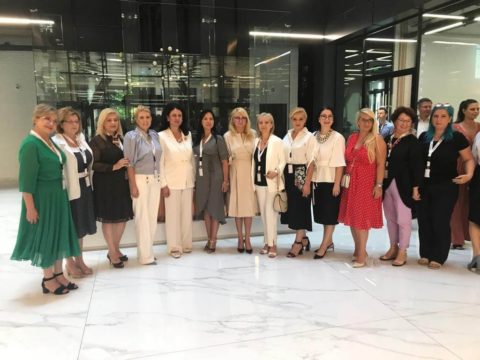 The need of support and promotion of women who have succeeded in business so that they become benchmarks of good practice are essential to stimulate the community of women entrepreneurs in Moldova, and the role of the partnership between the two bodies is to promote gender equality and the ability of women to assert themselves in society, through common plans and actions. Entrepreneurial education and digitalization are key factors in managing and developing the business and promoting gender equality. It also has been held meetings with representatives of the European Business Association - EBA and the Employers' Association of Light Industry APIUS.
The need of support and promotion of women who have succeeded in business so that they become benchmarks of good practice are essential to stimulate the community of women entrepreneurs in Moldova, and the role of the partnership between the two bodies is to promote gender equality and the ability of women to assert themselves in society, through common plans and actions. Entrepreneurial education and digitalization are key factors in managing and developing the business and promoting gender equality. It also has been held meetings with representatives of the European Business Association - EBA and the Employers' Association of Light Industry APIUS.
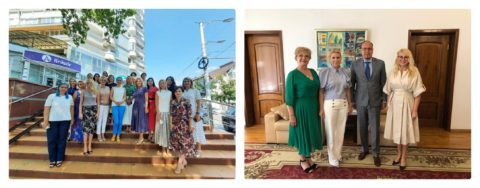
During the Economic Forum, meetings were held with many business women from the Republic of Moldova who were invited to join the international community of entrepreneurs that is being created within the Wingate project.
The Wingate project is funded by Iceland, Liechtenstein and Norway through the EEA and Norway Regional Cooperation Grant Fund.
#EEANorwayGrants #FundforRegionalCooperation
$15 billion to help women in developing countries access jobs
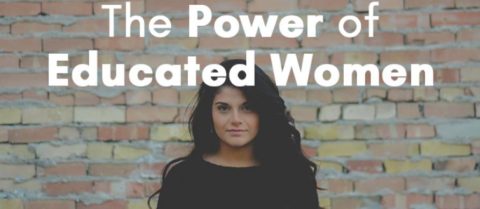
G7 foreign and development ministers meeting in London at the beginning of May will invest $15 billion in development finance over the next two years to help women in developing countries access jobs, build resilient businesses and respond to the devastating economic impacts of COVID-19.
They will also sign up to new global targets to get 40 million more girls into school and 20 million more girls reading by the age of 10 in low and lower middle income countries by 2026.
Educating girls is one of the smartest investments we can make to lift people out of poverty, grow economies, save lives, and build back better from COVID-19. A child whose mother can read is 50% more likely to live beyond the age of 5 years, twice as likely to attend school themselves – and 50% more likely to be immunised.
COVID-19 has had a disproportionate and profound impact on women and girls, including losing precious school time, reduced access to lifesaving sexual and reproductive health services, a spike in gender-based violence, and increased risk of job loss. Now, these fresh commitments by the world’s leading democracies, driven by the UK, put gender equality at the heart of global co-operation to build back better from COVID-19.
Even before the pandemic, women in developing countries had significantly fewer economic opportunities than men and shouldered the majority of unpaid care work reducing their time for paid work. COVID-19 has compounded this, with new research showing $1 trillion could be lost from global growth as female workers fall out of the workforce.



